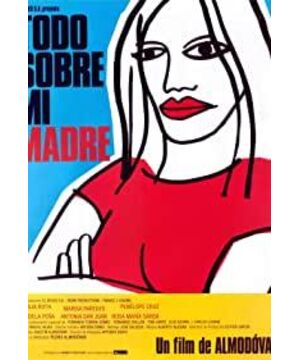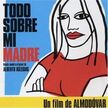Another homework archive, but I hope this point I wrote will make the teacher cue me in class? Ignore my broken English?
Prompt:
Describe one of the spaces featured in ALL ABOUT MY MOTHER in one or two substantive paragraphs. Consider some of the following questions: Is it cluttered or empty? Does it express a certain atmosphere? Is the design symmetrical or asymmetrical? Balanced or unbalanced? Stylized or natural? Is space used as an indirect comment on a character's inner state of mind or identity? Does space overwhelm the human beings in its midst? Does it figure as a character-like presence?
One space that especially impressed me is the tunnel where Manuela travels between Madrid and Barcelona. It appears twice in the film--once on the trip when Manuela goes back to Barcelona to find her son's father, Lola, and tell him (or her) about their son's death, while another on the trip when Manuela takes Rosa's son, Esteban, to Madrid to escape from Esteban's grandmother's hostility.
For the first tunnel scene, the space is symmetrical, empty, and unbalanced. We can see a huge black spot on the bottom center of the frame, radiating lights to every other corner. The empty center, figuratively, reflects the emptiness of Manuela's life and soul after losing her son, Esteban, in a car accident. Seventeen years ago, after leaving her husband, Lola, Manuela raises their son, Esteban, alone, pouring her heart into this boy. Esteban undoubtedly becomes the center of her life and her dearest person on the Earth, who Manuela would do everything for. Hence, Esteban's death leaves an enormous empty hole in Manuela's life and emotional attachment, bringing Manuela nothing but agony. Moreover,the duration of this scene is so long (at least longer than my expectation) that spectators feel like Manuela is going through an endless tunnel. The endless darkness, in fact, represents the endless fear of loss and future life in Manuela's mind, and the spectators' inability to stop this scene also reveals Manuela's inability to escape from the downward spiral of anguish. Another disturbing detail of this space is the stark contrast between the sparkling train light reflected on the tunnel ceiling and the pure blackness in the middle. The unbalanced and bizarre combination of contrasting colors, black and white, as well as motion and stillness, gives spectators a sense of overwhelming dizziness and suffocation, pushing spectators to feel as if they're are lost in time and space and to empathize with Manuela,who is experiencing the same kind of feelings a hundred times more intense than spectators'. Apart from the emptiness, grief, fear, and uncomfortableness conveyed through this space, the main color of this scene--black, which usually represents death--is also a mourn for Esteban's unfortunate death.
When this tunnel appears again on Manuela's trip to Madrid with the newborn Esteban, the black spot's size shrinks from more than one-sixth of the screen to approximately one-tenth of the screen. The shrinkage, however, can be viewed as the tunnel's development if it is considered as a character that represents the shadow that Esteban's death cast on Manuela. Under this assumption, the brighter tunnel that appears when Manuela goes to Madrid surely signifies a change in Manuela's life: new Esteban gives her hope to live and fills her emptiness in life. Interestingly, two years later, when Manuela returns to Barcelona with baby Esteban to attend an AIDS conference, the film does not provide any tunnel scene. Although we cannot say that Manuela has fully recovered from the loss of her son, to some degree,the disappearance of the tunnel implies that baby Esteban has become the continuation of the deceased Esteban's life, leading Manuela, who has endured misery and despair, to walk out of the darkness and embrace a new life.
View more about All About My Mother reviews











